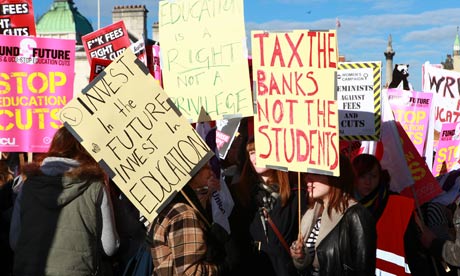Brodie Waddell
The world of UK universities has changed dramatically in the ten years since our first post appeared on the Many-Headed Monster, and it feels like the pace of change has recently accelerated.
So, while my co-bloggers are looking back at hangovers, Marxists, plebs and creative histories, I want to indulge in a bit of navel gazing. How has the role of the historian as a job been changing over the last decade? Much of my evidence comes from a sample size of one, but I think the sorts of things we’ve been talking about on the blog over the years give some sense of the wider climate.
I vividly remember my own circumstances in July 2012, when we started the blog, because it was a moment of personal chaos but also optimism. I was finishing up a postdoc and had recently been offered a three-year lectureship at Birkbeck, while at the same time trying to juggle the demands of a new baby. I have no idea why I thought it would be a good time to launch a new project, but I’m glad I did. Meanwhile, things were less chaotic but also less optimistic at the national level. The UK was in the midst of the Cameron-Clegg coalition government, and it was pretty clear that universities were generally going in the wrong direction, most obviously with annual tuition fees rising from £3,000 to £9,000 that very year.
What is intriguing, however, is that there is almost no evidence of this on the Many-Headed Monster. Posts from our first few years touched on lots of different historical topics, but very little on the job itself. That said, Laura’s reflections on conferences as ‘communitas’ and my complaints about boring exam questions are probably a fair reflection of the sort of day-to-day concerns of new lecturers, then and now, even if we somehow avoided mentioning the fact that we were then all currently or recently precariously employed. The closest we came to dealing with our jobs directly was ‘The Future of History from Below’ symposium in 2013, which included reflections on who we were writing for and why, an issue that we would now probably call ‘public history’, but which was barely discussed in academic circles just ten years ago. A couple years later, Laura set out her thinking on ‘What is history for?’ which again highlighted how we were increasingly questioning the purpose of our discipline in the wider world.
By 2015, the year that the Tories won their first majority since 1992, the challenges faced by the profession began to receive more direct attention on the Monster. It was clear by that point that there was a ‘terrible job market for new humanities PhDs’ and I went looking for data to try to figure out what was going on. I found that the number of new History PhDs had grown much faster than the number of new students or new lecturers, and this was creating an employment problem that was getting worse. Revisiting the situation in later years with newer data and different data showed that there were no signs of improvement.
In 2018, after the Brexit vote and another Tory election win, we found ourselves facing a new challenge – or opportunity – in the form of a fourteen-day strike, the longest ever in the history of UK higher education, and merely the first of a series of labour disputes that continues to rumble on today. We wondered at the ‘striking parallels’ between early modern protests and the university dispute, though by the end of the first action it was already clear that the power of the employers and their political allies was stronger than many of us had first anticipated.

When covid hit, the whole profession was shaken yet again by the sudden switch to online working. We have talked about the many benefits and drawbacks of online teaching and conferencing, as well as the problems created by the rush to get students back into classrooms in Autumn 2020. It is now clear that university teaching is never fully going back to the pre-covid situation, and we are still learning on the job while trying to deal with the ballooning workloads caused by these disruptions.
Finally, we have only slowly and fitfully begun publicly attending to the gender and racial skew in our profession. In 2017, we posted a reading list of scholarship by people of colour, though it was actually preceded by Kim Hall and Hannah Ehrenberg’s vitally important annotated bibliography. A bit later, Laura put up her teaching resource on decolonising and Black British history which remains invaluable. Meanwhile, although there are no posts directly on the gendered inequalities in academia, we are not short on discussions of early modern women, including our symposium on Alice Clark’s Working Life of Women which touches on the importance of her research in inspiring more recent feminist historians.
Now, however, many of these previous discussions of the challenges facing the profession seem tame, even quaint, compared to the existential issues that we are grappling with today. There are no signs that the four-year long labour dispute will be resolved any time soon and our pensions have already suffered a brutal blow, despite our resistance. Indeed, with the threat of redundancies looming at numerous institutions, it would be surprising if this conflict did not intensify. Meanwhile, the culture wars rage on more viciously, with much of the government and media evidentially deciding that ‘woke’ historians are among the greatest threats to the nation.
For all that, the study of history is stronger than ever in other ways. As a whole, historians are now much more likely to engage with the wider public, to understand the inequalities in the profession, and to constantly ask ourselves why early modern history matters. Indeed, we want to hear from you about why people outside our own narrow specialisms should care about our research and teaching. I cannot claim to be optimistic about the situation faced by historians in the near future, but I do think that we have a clearer sense of what we are doing and why we are doing it than perhaps ever before.


The Conservative Party did not win the 2017 General Election. It lost its majority in the House of Commons and did a deal for support from the Democratic Unionist Party of Northern Ireland.
Yes, though I think ‘another Tory election win’ and ‘election in which the Tories retained control over all substantive aspects of domestic governance by buying the support of a tiny right-wing party’ is sufficiently close for purposes of discussing UK higher education policy, so I’m going to leave the wording unchanged.
It was because the Conservative Party did not have a majority in the House of Commons after the 2017 General Election that the 2019 General Election had to be called, mainly over the ‘Brexit’ issue.
Your mention of my ‘what is history for?’ post reminded me of it’s origins Brodie – it was actually a very condensed version of an essay I wrote for one of my Postgraduate Certificate in Academic Practice modules (for those who don’t know, this is a teaching qualification that lecturers at many HE institutions are required to have). I remember the essay was basically written as a response to the then Education Secretary Michael Gove’s reform of the History curriculum for schools, which in it’s first draft was met by sustained opposition from teachers and academics across the political spectrum (more on that here – objectors included Simon Schama, Richard Evans, David Cannadine, Niall Ferguson and Malorie Blackman).
Gove’s reforms were extremely widely criticised by historians for providing a celebratory, very narrowly focused nationalist syllabus, but I was responding more to the conception of History as a discipline that underpinned this approach. My target was his limited understanding of history as one even after another, and as a list of facts selected because they support a particular story – in this case a very out dated tale of national destiny that Gove wanted to tell. I opened with a dissection of some of his comments on history, and then moved on to what I thought history actually was.
None of this is particularly explicit in my post. So your post made me reflect both about just how long standing the war on history is (and it’s now part of a much wider ‘cultural war’ that is tragically already coming to the fore in the latest Tory leadership contest), as well as on the ways that often our politics on the monster has been implicit over the years. As you say, as the challenges facing the profession became increasingly urgent, this is reflected more and more in the tone and content of our posts.
Ah yes, I’d happily forgotten about Gove’s jingoistic initiative! As you say, none of this is entirely new. I know there were major retrenchments of higher ed funding, including mass job losses, in previous eras – summarised on History & Policy ( https://www.historyandpolicy.org/policy-papers/papers/university-fees-in-historical-perspective) and Peter Mandler suggests that ‘the number of permanent history staff was cut by more than 12 percent in the 1980s’ (https://www.jstor.org/stable/43696904). There have also been previous ‘culture wars’ in which universities, humanities in particular, were a target, and the current one has been going since at least the Brexit campaign. In some ways, it is probably simply that people like me lack the institutional memory to put the current crisis into proper historical perspective, a dangerous blindspot for a historian!
Pingback: Blogging and the Day Job: Tales from the Blarchive | the many-headed monster